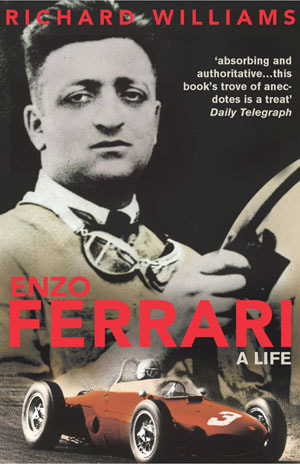Book Review: Enzo Ferrari, A Life by Richard Williams

In 2011 I had a conversation with the late John Surtees at the Goodwood Revival. He was generous with his time in an unscheduled interview. We mostly talked about his time at Ferrari in the mid-1960s. Among other things, Surtees said, “You have to respect Mr Ferrari for what he created. […] There’s something special about it and there was something special about him, except that by the time I was there, he was too isolated. He’d stopped going to race meetings and was too removed from it, which in turn brought problems.”
Surtees’ summary above tallies closely with my lasting impression from reading Richard Williams’ classic biography of Enzo Ferrari, published more than 20 years ago. The 1964 Formula 1 World Champion was one of the sources to whom Williams turned for a volume that is as thoroughly researched as any motor racing book you’ll ever read.
Much of the material comes from older, less available published sources, such as Ferrari’s own My Terrible Joys from 1963. That’s not to diminish Williams’ work in any way – it’s not as if Ferrari himself, Tazio Nuvolari or Wolfgang von Trips are still around to interview in person. And given Ferrari’s apparent penchants for withering put-downs and rewriting history, I’m happy to give Enzo’s own memoirs a swerve.
Williams’ narrative guides us from Ferrari’s upbringing in Modena and early days as a driver and car dealer, via his time in charge of the Alfa Romeo race team and the political machinations that ensued, to the foundation of the modern Ferrari company and the progress of the Scuderia until his death in 1988. At almost every turn, Ferrari himself thrived on chaos, happy to pit one driver or employee against another in a bid to raise the level of competition. The costly legacy of that approach would appear to linger in the blame culture that pervaded the Formula 1 team well into the twenty-first century – and its continuing failure to sustain success on the track.
Punctuating the smack-your-head moments of needless conflict, the intrigue, opportunities lost, countless deaths and evocative insight into the early decades of grand prix racing, are wonderful asides that at least partially filled the chasms in my own knowledge of Ferrari history, like the colourful exploits of playboy Ferrari owner, Porfirio Rubirosa. The briefly told stories of Italian drivers like Nuvolari, Varzi and Musso are absorbing diversions that help to round out the story.
Add to these themes a comprehensive account of the Commendatore’s complex personal life and Williams covers all the bases in Enzo Ferrari, A Life. Personally, I emerged from the experience educated, thoroughly entertained and somewhat in awe of what Ferrari achieved, but never with the thought that he was also a likeable human being.
Enzo Ferrari, A Life
by Richard Williams
Yellow Jersey Press, 2001. ISBN 978-0-22405-986-2
Find it on eBay
Surtees’ summary above tallies closely with my lasting impression from reading Richard Williams’ classic biography of Enzo Ferrari, published more than 20 years ago. The 1964 Formula 1 World Champion was one of the sources to whom Williams turned for a volume that is as thoroughly researched as any motor racing book you’ll ever read.
Much of the material comes from older, less available published sources, such as Ferrari’s own My Terrible Joys from 1963. That’s not to diminish Williams’ work in any way – it’s not as if Ferrari himself, Tazio Nuvolari or Wolfgang von Trips are still around to interview in person. And given Ferrari’s apparent penchants for withering put-downs and rewriting history, I’m happy to give Enzo’s own memoirs a swerve.
Williams’ narrative guides us from Ferrari’s upbringing in Modena and early days as a driver and car dealer, via his time in charge of the Alfa Romeo race team and the political machinations that ensued, to the foundation of the modern Ferrari company and the progress of the Scuderia until his death in 1988. At almost every turn, Ferrari himself thrived on chaos, happy to pit one driver or employee against another in a bid to raise the level of competition. The costly legacy of that approach would appear to linger in the blame culture that pervaded the Formula 1 team well into the twenty-first century – and its continuing failure to sustain success on the track.
Punctuating the smack-your-head moments of needless conflict, the intrigue, opportunities lost, countless deaths and evocative insight into the early decades of grand prix racing, are wonderful asides that at least partially filled the chasms in my own knowledge of Ferrari history, like the colourful exploits of playboy Ferrari owner, Porfirio Rubirosa. The briefly told stories of Italian drivers like Nuvolari, Varzi and Musso are absorbing diversions that help to round out the story.
Add to these themes a comprehensive account of the Commendatore’s complex personal life and Williams covers all the bases in Enzo Ferrari, A Life. Personally, I emerged from the experience educated, thoroughly entertained and somewhat in awe of what Ferrari achieved, but never with the thought that he was also a likeable human being.
Enzo Ferrari, A Life
by Richard Williams
Yellow Jersey Press, 2001. ISBN 978-0-22405-986-2
Find it on eBay